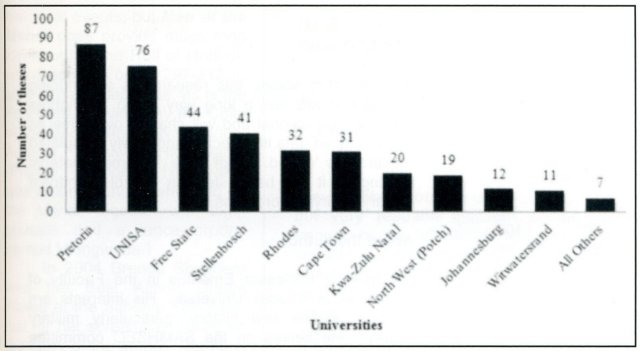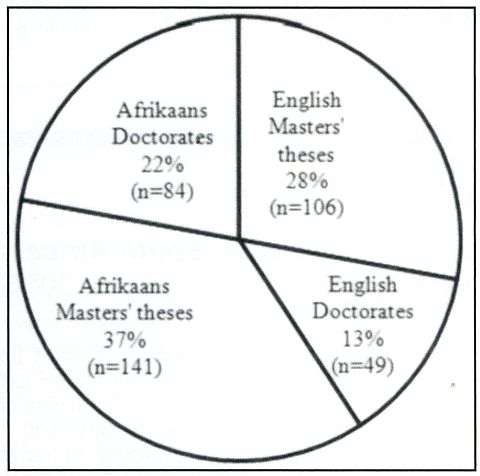

 The South African
The South African
INTRODUCTION
A countrywide survey has been conducted over the past several years with a view to developing a directory of doctoral and master's research on military history produced in South Africa. It has revealed a rich source of information and insights not readily available to military historians or other interested persons. The accumulated data is being analysed and collated with a view to making it, or at least access to it, available to a wider audience. It is hoped that this will encourage more public interest in South African military history with spinoffs such as better preseNation of our monuments and other physical structures. It may also make the work of researchers, both professional and amateur, easier as it will save time simply searching for what exists.
Apart from the intrinsic interest of such an analysis, other intentions in conducting this survey were: firstly, to encourage research on South African military history by providing an indication of the work wtlich has been done and thus stimulate further work either in developing issues which have been opened up or in filling in gaps; and to open up the rich variety of military history which has been done in South Africa to a wider international audience. In the case of other disciplines, such an approach has reaped gratifying responses.
THE SCOPE OF THE PROJECT
While aiming to be all encompassing within the South African context, the project has not initially included works on South Africa produced in other countries, as locating and accessing theses abroad is an entirely different and costly process. Thus far 70 such works have incidentally been found and available details on them have been noted for possible follow-up at a later stage. A number of shorter works, sometimes also referred to as theses, have been part of Diploma or Honours requirements. These have not been included as they are generally less rigorous than either master's or doctoral work. They are also notoriously difficult to locate and access as institutions of higher education generally do not retain them or even keep records of them.
To date, June 2017, some 519 South African doctoral dissertations and master's, theses (hereafter generally referred to as 'theses') have been identified as potentially containing material of military historical interest. These are from a wide range of sources including library searches, references in texts where such information is likely to occur, and personal communications. For 380 (73%) of these, basic data (name, date, full title, degree, and institution) have been obtained. Of these, 30 have so far been analysed and documented in some detail, ie the above fields plus the site of the research, sources of the document, methods employed, and key words identified (for purposes of searching for topics).
As some of the earlier theses did not contain summaries or abstracts, summaries have been developed for them. Also included are general notes of interest such as related works and whether the particular dissertation/thesis has been published in some form. Hopefully, a directory for all or part of the 519 theses noted here can be made publically available in due course.
GENERAL APPROACH
A broad view is taken of military history. All military history has political, economic, social and cultural contexts. I have accordingly attempted to trace work which has any reference to military events or issues in South Africa, basically asking: 'Does it inform us or enlighten us, or give us a different angle of some aspect of military history?' While some theses focus solely on specific incidents (such as a particular battle, an example being AI Breytenbach's (1980) 'Die slag by Donkerhoek, 11-12 Junie 1900', events (for example, the Anglo-Boer War, 1899-1902) or issues (such as the role of the military chaplain), many include military history as an integral part of a different focus or topic. This may be in a discrete chapter or it may be woven throughout the fabric of the thesis. Histories of towns in South Africa, particularly those founded before 1899, often follow this pattern. Examples are M Gibbens' (1982) 'Two decades in the life of a city: Grahamstown 1862-1882', which includes coverage of the 9th Frontier War of 1878-1879, and B F Booysen's (1986) ''n Geskiedenis van Jansenville - dorp en distrik, 1855-1955'. Another example of integrating military history, where relevant, into a wider topic is A P J van Rensburg's (1964) 'Die ekonomiese herstel van die Afrikaner in die Oranjerivier-Kolonie, 1902-1907' (The economic recovery of the Afrikaner in the Orange River Colony, 1902-1907') in which the depredations of the British army are a pervasive background. Some theses deal only marginally with military history as such, an example being S O Babrow's (1962) 'A critical assessment of Dr George McCall Theal'. This thesis is, in essence, a literary and historical criticism, but it is of interest as Theal's writings include much military history.
THE NATURE OF DISSERTATIONS AND THESES
Most military history theses in South Africa have been done in Arts/Humanities faculties of universities, as one might expect. Some have, however, also been done in Science, Commerce, Engineering and even Divinity faculties - much depending upon the discipline and prior qualification of the student's undergraduate study. Thus, apart from the usual PhDs, the doctoral degrees under which military history may fall include D Phil, D Litt et Phil (D Lettere en Wysbegeerte), D Ed, D Com, DD (Divinity) and D Th (Theology). While most of the master's degrees fall under the title of MA, military history studies are also found under the titles of M Phil, M Mil, MSc, M Com, MBA, MBL, MEd, MTh and M Soc Sc. These particular appellations depend upon individual universities' degree structures and choice of terms.
Analysis of the theses suggest that there is much of value in consulting them when researching a topic, yet it is striking, when looking at lists of references consulted in published articles, how infrequently theses appear. Up until very recently, this may in part have been accounted for by writers/researchers being unaware of what dissertation and thesis-type research existed as most of these documents were stashed away in the basements of libraries and seldom found on any publicly accessible databases. In the past few years, most universities have moved towards digitising their archival documents, including dissertations and theses. While, in theory, this should facilitate accessibility for researchers to trace material, in practice it is not necessarily the case as a new set of difficulties have presented themselves. These difficulties will be documented together with suggestions on how to deal with them, at a later stage in the research.
The quality of the research carried out for higher degrees varies considerably. As judgement of quality is, however, a highly subjective and sometimes contentious matter, it is not covered in this project. Suffice it to say that there are theses at both the doctoral and master's level which do not add much insight and understanding or have a critical engagement with the material in them. There are also many first rate pieces of work which would hold their own anywhere in the world. Some are, or have been in their time, at the cutting edge of military historical research. The matter of judgement of quality is left to individual researchers or research teams to measure and work with.
We should note, too, that while there are broadly accepted guidelines for the relative lengths of master's and doctoral research reports, some master's theses are longer and have dealt with their subject matter in much greater depth, and with much greater critical insight, than some doctoral dissertations. Length in itself is not a criterion of quality. In general, however, doctoral dissertations reflect, or should reflect, a greater depth of insight and analysis, as well as critical engagement with their research material than one would expect from a master's thesis .
With reference to the 380 works referred to above, a number of interesting patterns emerge. A breakdown of the institutions where the research has been conducted is given in Figure 1, while the language of presentation and type of degree is reflected in Figure 2.

Figure 1. Institutions at which doctoral dissertations and master's theses have been produced

Figure 2. Degree types by language of presentation
While the data presented will be in the original language of the thesis, the titles, keywords and summaries/abstracts of all Afrikaans theses will be translated to facilitate international access.
To my knowledge, no military history thesis has yet been presented in an indigenous southern African language other than Afrikaans. Note that in terms of Figures 1 and 2, there is not necessarily any correlation between language of presentation and the institution of study. A number of English theses have, for example, been produced at the Universities of Pretoria, Stellenbosch and Unisa.
TEMPORAL ANALYSIS
The earliest South African military history thesis which I have thus far been able to trace is dated 1916. It is the MA of one Pieter Roux, interestingly titled 'Die verdedigingstelsel aan die Kaap onder die Hollandse-Oosindiese Kompanjie 1652-1795' ('The defence system at the Cape under the Dutch East India Company 1652-1795') and is a largely descriptive work.
The most recent dissertation I have read is McGill Alexander's 'The airborne concept in the South African military, 1960-2000: Strategy versus tactics in small wars', a coincidental 100 years later and a world apart in content, style and analysis.
After 1916, the next work completed was in 1921, after which the output reached a peak in the decade 1971-1980. The date of completion is thus far available for a total of 478 dissertations and theses.
Table 1 shows the pattern by decade over the period 1911 to 2010, as well as some for the current decade.
| Decade | Doctorates | Master's theses | Total |
|---|---|---|---|
| 1911-1920 | 0 | 1 | 1 |
| 1921-1930 | 2 | 8 | 10 |
| 1931-1940 | 5 | 21 | 26 |
| 1941-1950 | 17 | 33 | 50 |
| 1951-1960 | 16 | 25 | 41 |
| 1961-1970 | 18 | 30 | 48 |
| 1971-1980 | 33 | 70 | 103 |
| 1981-1990 | 27 | 63 | 90 |
| 1991-2000 | 15 | 47 | 62 |
| 1991-2000 | 15 | 47 | 62 |
| 2001-2010 | 17 | 15 | 32 |
| 150 (32%) | 313 (68%) | 463 | |
| 2011-2020* | 7 | 8 | 15 |
| Total | 157 | 321 | 478 |
* This decade is shown separately, as basic data at the time of writing had only been obtained for fifteen theses. There are several more from this period for which basic date has not yet been obtained and others will almost certainly appear before the end of the decade. The current working total is thus at present 478.
CONCLUSION
As suggested above, this research is an ongoing project and still has a long way to go. All figures given are provisional and will change over time as more detailed data is collected and newly completed research is added. From time to time, material relating to it will be posted on the blog:
https:// militaryhistorysa.word press. com
About the author
Pat Irwin is Professor Emeritus in the Faculty of Education at Rhodes University. His interests are ecology, wildlife and history, particularly military history. He serves on the SAMHSEC committee where he and his wife, Anne, produce the monthly Military History Newsletter for the Eastern Cape. Email: p.irwin@ru.ac.za
Return to Journal Index OR Society's Home page
South African Military History Society / scribe@samilitaryhistory.org